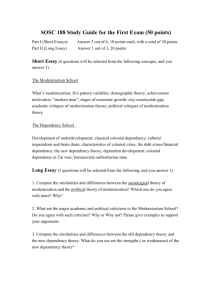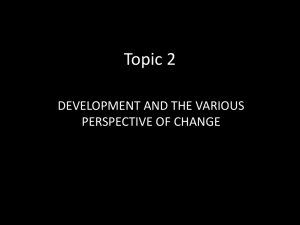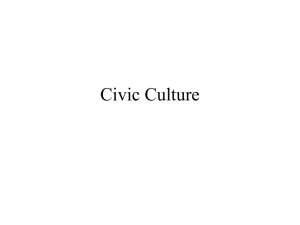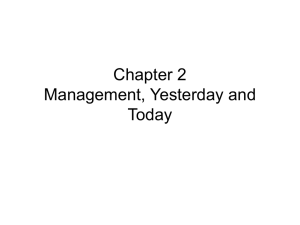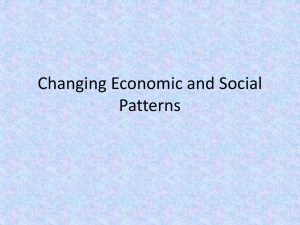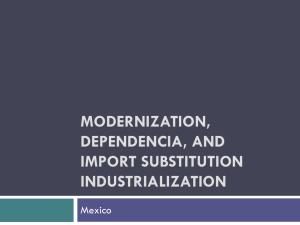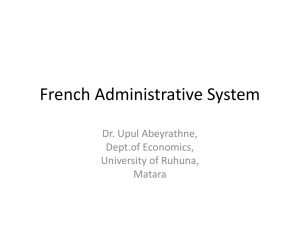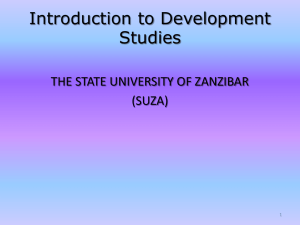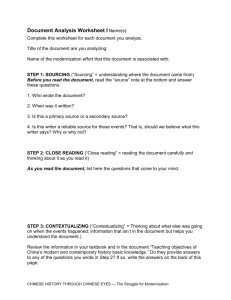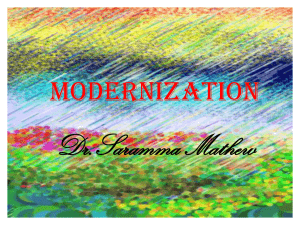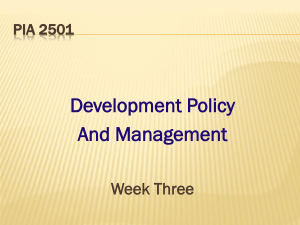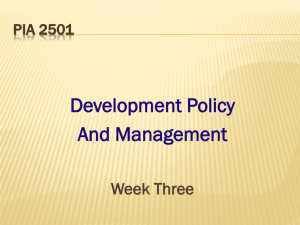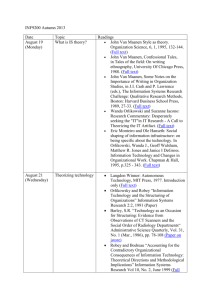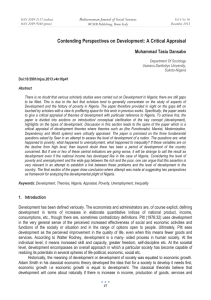INTERNATIONAL COMMUNICATION
advertisement
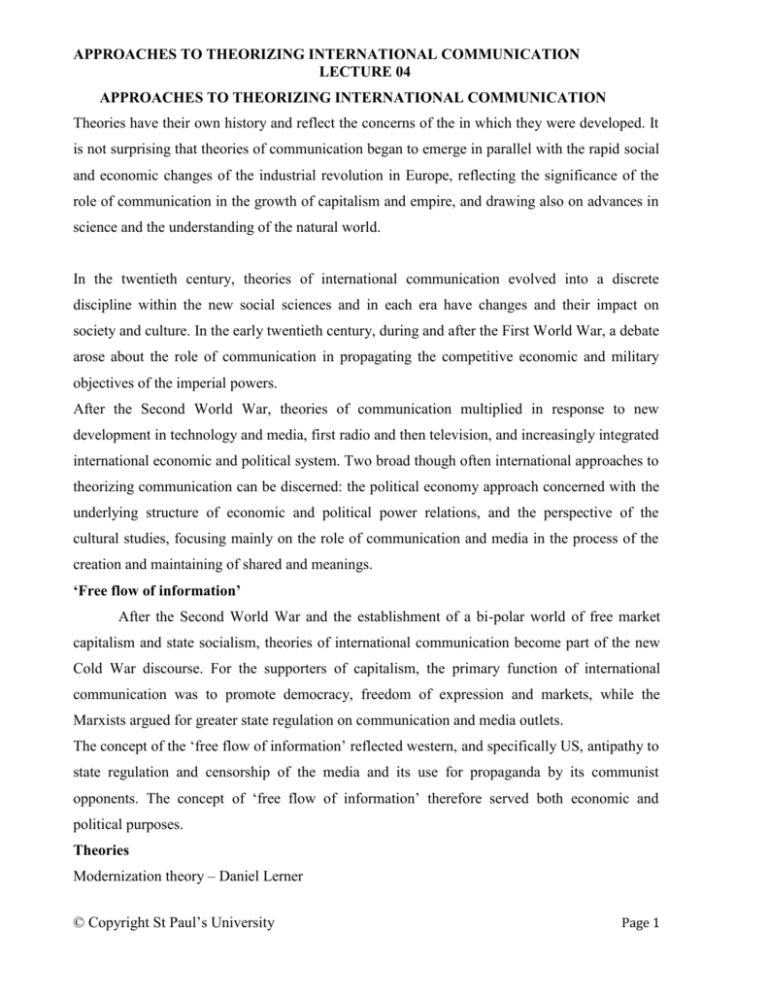
APPROACHES TO THEORIZING INTERNATIONAL COMMUNICATION LECTURE 04 APPROACHES TO THEORIZING INTERNATIONAL COMMUNICATION Theories have their own history and reflect the concerns of the in which they were developed. It is not surprising that theories of communication began to emerge in parallel with the rapid social and economic changes of the industrial revolution in Europe, reflecting the significance of the role of communication in the growth of capitalism and empire, and drawing also on advances in science and the understanding of the natural world. In the twentieth century, theories of international communication evolved into a discrete discipline within the new social sciences and in each era have changes and their impact on society and culture. In the early twentieth century, during and after the First World War, a debate arose about the role of communication in propagating the competitive economic and military objectives of the imperial powers. After the Second World War, theories of communication multiplied in response to new development in technology and media, first radio and then television, and increasingly integrated international economic and political system. Two broad though often international approaches to theorizing communication can be discerned: the political economy approach concerned with the underlying structure of economic and political power relations, and the perspective of the cultural studies, focusing mainly on the role of communication and media in the process of the creation and maintaining of shared and meanings. ‘Free flow of information’ After the Second World War and the establishment of a bi-polar world of free market capitalism and state socialism, theories of international communication become part of the new Cold War discourse. For the supporters of capitalism, the primary function of international communication was to promote democracy, freedom of expression and markets, while the Marxists argued for greater state regulation on communication and media outlets. The concept of the ‘free flow of information’ reflected western, and specifically US, antipathy to state regulation and censorship of the media and its use for propaganda by its communist opponents. The concept of ‘free flow of information’ therefore served both economic and political purposes. Theories Modernization theory – Daniel Lerner © Copyright St Paul’s University Page 1 APPROACHES TO THEORIZING INTERNATIONAL COMMUNICATION Mass media helps transform societies Dependency theory – Schiller Multinational corporations result in cultural imperialism Structural Imperialism – Gal Tung Center and periphery states; Core and less developed Hegemony – Gramsci Dominant social group within society dominates media Critical theory – Horkheimer, Adorno, and Marcuse Mass culture is a commodity to be sold resulting in standardization Public Sphere – Habermas Capitalism has reduced access of information to the public Cultural Studies – Hall Different cultures interpret media messages differently Modernization theory Definition: Mass media helps transform societies. Explanation: Complementary to the doctrine of ‘free flow’ in the post-war years the view that international communication was the key to the process of modernization and development for the so-called ‘Third World’ .Modernization theory arose from the notion that international mass communication could be used to spread the message of modernity and transfer the economic and political models of the west to the newly independent countries of the South. Communication research on what came to be known as ‘modernization’ or ‘development theory’ was based on the belief that the mass media would help transform traditional societies. One of the earliest exponent of this theory was Daniel Lerner, Lerner proposed that contact with the media helped the process of transition from a ‘traditional’ to a ‘modernized’ state, characterizing the mass media as ‘mobility multiplier’ ,which enables individuals to experience events in far-off places, forcing them to reassess their traditional way of life. Exposure to the media, Lerner argued, made traditional societies bound by traditions and made them aspire to a new and modern way of life. Another key modernization theorist Wilbur Schramm saw the mass © Copyright St Paul’s University Page 2 APPROACHES TO THEORIZING INTERNATIONAL COMMUNICATION media as a ‘bridge to a wider world’ as the vehicle for transferring new ideas and models from the North to the South and, within the south, from urban to rural areas. Schramm endorsed Lerner’s view that mass media can raise the aspirations of the people in the developing countries. The mass media in the South, he wrote, ‘face the need to rouse their people from fatalism and a fear of change. They need to encourage both personal and national aspirations. Individuals must come to the desire a better life then they have and to be willing to work for it. In the 1970s, modernization theorists started to use the level of media development as an indicator of general societal development. Failure of the modernizers One major shortcoming of the early modernization theorists was their assumption that the modern and the traditional lifestyles were mutually exclusive, and their dismissive view of the culture of the ‘indigent natives’ led them to believe in the desirability and inevitability of a shift from the traditional to the modern. The dominant the culture and religious force in the region of – Islam - and a sense of collective pan-Islamic identity were seen as ‘sentimental sorties into the symbolism of a majestic past’. The elite in the region had to choose between ‘Mecca and mechanization’. The crux of the matter, Lerner argued, was ‘not whether, but how one should move from traditional ways toward modern life-styles. The symbols of race and ritual fade into irrelevance when they impede living desire for bread and enlightenment’. What modernizers such as Lerner failed to comprehend was that the dichotomy of modern versus traditional was not investable. Despite the entire west’s effort at media modernization, Islamic traditions continue to define the Muslim world, and indeed have become stronger in parts of the Middle East. In additions, these cultures can also use modern communication methods to put their case cross. In the 1979 Islamic revolution in Iran, for example, radical groups produced printed material and audiocassettes and distributed them through informal network to promote an anti-western ideology based on a particular Islamic view of the world. Dependency theory Definition: • Multinational corporations result in cultural imperialism. • A situation in which the economy of a certain group of a countries is conditioned by the development and expansion of another economy, to which their own subjected. © Copyright St Paul’s University Page 3 APPROACHES TO THEORIZING INTERNATIONAL COMMUNICATION Explanation: Dependency theory developed in the late 1960s and 1970s under the guidance of the United Nations Economic Commission for Latin America. It was developed out of the fact that economic growth in the advanced industrialized countries did not lead to growth and development in poorer countries. A historical condition which shapes a certain structure of the world economy such that it favors some countries to the determinant of others and limits the development possibilities of the subordinate economics. Dependency theory was the view that transnational corporations most based in the North, exercise control, with the support of their respective governments, over the developing countries by setting the terms for global trade – dominating markets, resources, production, and labor. Development for these countries was shaped in a way to strengthen the dominance of the developed nations and to maintain the ‘peripheral’ nation in a position of dependence – in other words, to make conditions suitable for ‘dependent development’. In its most extreme form the outcome of such relationship was ‘the development of underdevelopment’. Two key points • Dependency is the source of underdevelopment. • Dependency is the result of the imposition of a set of external conditions on third world development. A group of the Latin American intellectuals (especially economists and sociologists), in the early 1960s began an overall critique to modernization theory. ECLA’s scholars started a set of theoretical approach that was going to be known generically as Dependency theory. It is argued that most of the foundations of the theoretical categories and development policies rooted in the modernization school have been exclusively based on the historical experience in European and North American advanced capitalist countries. These western analytical categories are not suitable to guide our understanding of the underdevelopment problem of the Third World. Underdevelopment formula • The colonial history planted the seed in political, economic, cultural and administrative dependence. © Copyright St Paul’s University Page 4 APPROACHES TO THEORIZING INTERNATIONAL COMMUNICATION • Foreign capital and surplus penetrating in the national economy keeping the unequal exchange. • Loss of economic control, wealth, and distribution to foreign powers. • Underdevelopment and economic stagnation. Critiques • It simplifies the core-periphery classification of countries, incapable of encompassing the variety of situation prevalent in international relations • It plays down endogenous factor in explaining underdevelopment. © Copyright St Paul’s University Page 5
